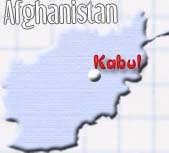Afghan minister slams Pakistan at German security conference
 Berlin - Afghan Foreign Minister Rangin Dadfar Spanta Tuesday accused Pakistan of being responsible for instability along their mutual border, but also acknowledged Afghan mistakes, during an international security conference being held in Berlin.
Berlin - Afghan Foreign Minister Rangin Dadfar Spanta Tuesday accused Pakistan of being responsible for instability along their mutual border, but also acknowledged Afghan mistakes, during an international security conference being held in Berlin.
Spanta said Pakistan was assisting international terrorism through its ISI intelligence agency and through its military.
But he also noted a "culture of impunity" within Afghanistan, where former warlords continued to hold sway in many areas and drug lords were gaining the upper hand in others.
Spanta warned that failure by the international community in Afghanistan would have repercussions well beyond the region.
German Defence Minister Franz Josef Jung called for more civilian aid and greater Afghan responsibility, insisting that military means would not bring security to the country.
"We have to give the process an Afghan face. We will not win the process militarily," Jung told the conference organized by the business daily Handelsblatt.
Germany aims to increase its military deployment to 4,500 from 3,500 when parliament votes on extending the Afghan mandate in October.
The German ground troops are deployed in the relatively peaceful north, while five reconnaissance jets patrol the entire Afghan airspace.
The German cabinet is currently updating its "Afghanistan Concept."
The German aid contribution is being raised to a total of 170 million euros (243 million dollars) this year, with an additional 30 million euros going to food relief amid a serious drought.
The military operation costs around 500 million euros a year.
Government spokesman Ulrich Wilhelm stressed the "comprehensive approach" taken by the German government, defining this as "no security without reconstruction and no reconstruction without security."
He warned that a premature ending of the international operation in Afghanistan would destabilize the entire region.
The German parliament is set to renew the Afghan deployment next month, extending the mandate by 15 months instead of the usual 12 to take it past elections set for September next year.
The Bundestag is seen as certain to back the increase in the number of troops and the extension, given cross-party support for the deployment, although polls have shown repeatedly that the German electorate is opposed.
Last month, a German soldier was killed and three others were wounded in a roadside bomb blast in Kunduz Province. The soldier was the 27th German soldier to die in Afghanistan since the start of the deployment in 2002.
Subsequently German soldiers opened fire on a civilian vehicle after the driver failed to stop at a checkpoint outside of Kunduz city, killing two children and a woman.
Both incidents led to renewed calls for German troops to be pulled out. dpa